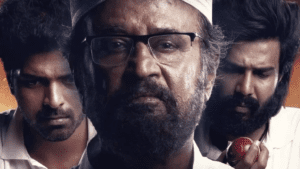Lal Salaam A Socially Relevant Drama Anchored by Rajinikanth’s Compelling Portrayal of Moideen Bhai.
2 min read 2024-02-09, 04:40 PM IST
Summary |
In the realm of Indian cinema, “Lal Salaam” emerges as a beacon of social relevance and narrative depth, with Rajinikanth’s portrayal of the Muslim leader Moideen Bhai serving as the film’s formidable backbone. Directed by his daughter Aishwarya, this cinematic offering delves into the intricacies of societal dynamics and political turmoil, weaving a tapestry of resilience and redemption against the backdrop of contemporary India. (also read: Stock of Sun TV).
At the heart of the narrative lies Moideen Bhai, a character brought to life with unparalleled charisma and gravitas by Rajinikanth. As a Muslim leader navigating the complexities of identity and allegiance, Moideen Bhai emerges as a symbol of unwavering conviction and moral fortitude. Rajinikanth’s portrayal infuses the character with a palpable sense of authenticity, capturing the nuances of his inner turmoil and external defiance with remarkable precision.

Director Aishwarya deftly navigates the intricacies of the narrative, seamlessly blending elements of drama, politics, and social commentary to create a compelling cinematic experience. Through Moideen Bhai’s journey, the film delves into themes of communal harmony, political machinations, and the power of grassroots activism in effecting meaningful change.
One of the film’s most striking aspects is its unflinching portrayal of contemporary socio-political realities. Aishwarya fearlessly confronts issues of religious polarization, systemic injustice, and the erosion of democratic values, painting a stark yet poignant portrait of a nation at a crossroads. Through Moideen Bhai’s unwavering commitment to justice and equality, the film offers a glimmer of hope amidst the prevailing darkness, inspiring viewers to contemplate the power of individual agency in shaping collective destiny. (also read: Teri Baaton Mein Aisa Uljha Jiya).
Furthermore, “Lal Salaam” shines a spotlight on the marginalized voices often silenced by the cacophony of mainstream discourse. From the struggles of minority communities to the plight of disenfranchised youth, the film amplifies the voices of those on the fringes of society, compelling viewers to confront uncomfortable truths and interrogate their own complicity in perpetuating systemic injustice.
In addition to Rajinikanth’s tour de force performance, the film boasts a talented ensemble cast who bring their characters to life with aplomb. From seasoned veterans to rising stars, each actor delivers a nuanced portrayal, adding depth and dimension to the rich tapestry of the narrative.
The cinematography of “Lal Salaam” deserves special mention for its evocative imagery and visual storytelling. From sweeping landscapes to intimate character moments, every frame is imbued with a sense of urgency and purpose, drawing viewers deeper into the world of the film and the lives of its inhabitants.
While “Lal Salaam” is undeniably a politically charged drama, it never succumbs to didacticism or moral grandstanding. Instead, Aishwarya navigates the narrative with a deft touch, allowing the characters and their actions to speak for themselves. The result is a film that resonates on a deeply human level, transcending ideological divides to offer a universal message of compassion, resilience, and hope.
“Lal Salaam” stands as a testament to the power of cinema to provoke thought, spark dialogue, and inspire change. Anchored by Rajinikanth’s commanding performance and Aishwarya’s deft direction, the film is a socially relevant masterpiece that demands to be seen and heard. As Moideen Bhai and his allies march boldly into the fray, they remind us that the fight for justice and equality is not just a political imperative but a moral imperative as well.

